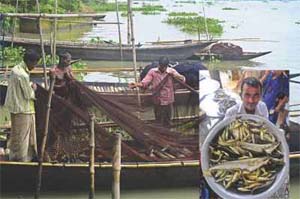Fishermen reappear as river swells with rainwater
 It is monsoon and the fishermen of Basila are all smiles. After nine months, they are back in business, fishing in the rain-fed Buriganga.
It is monsoon and the fishermen of Basila are all smiles. After nine months, they are back in business, fishing in the rain-fed Buriganga.
But the joy of fishing will soon be gone for Ratan Rajbangshi, who was born and raised in a fisherman’s family. And that will be because when the monsoon ends, the Buriganga will shrink and stink again. The fishes will be gone. From October till June, the Buriganga will remain highly contaminated, thanks to the tannery wastes being dumped into the water for decades.
For now, though, Ratan and three of his associates catch five to six kg of fish daily, earning about Tk 1,700.
“This will last till September. After that we will be jobless. The river water will contain dangerous toxic materials then,” says Laxman Rajbangshi, another fisherman.
A number of Rajbangshis say they are among the last of the fishermen in and around Dhaka.
Laxman says his forefathers, going back four generations, were born at Basila where they lived and died as fishermen. The Buriganga and other rivers around the capital were then more generous, their waters cleaner.
“None of my three sons has taken up this profession. They are working in factories,” said Laxman.
Having perceived a grim future for their family profession, the youths of Shreekhanda village have turned to car servicing or factory jobs.
“We are witnessing the death of a livelihood of centuries,” said Ratan Rajbangshi.
Three decades ago, the river threw up big fishes. Ratan remembers he and his father once caught a 30 kg ruhi fish. “The prawns were so big and tasty then.”
Since the late 1970s the Buriganga has become a dumping yard for tannery wastes.
As a result, the fishermen living on the river do not have a regular income. Hundreds have left the profession; hundreds others have left the villages to find a living elsewhere.
Those who considered living far from water very difficult initially sold off their fishing boats and whatever small patches of land they had to maintain their families. Now some fishermen work as day labourers at different construction sites, said Ratan and Laxman.
People living by the Buriganga say the Buriganga water is so contaminated that they cannot graze their cattle on the bank. Animals die if they drink from it.
The sight of carcasses of cattle floating on the Buriganga is common in winter when the level of pollution heightens.
“Had the government taken some action to stop the pollution, many people like us could have led better lives,” said Nitai, another fisherman, describing the miserable lives they lead.
On the government move to relocate the tannery industry to Savar, Nitai, in his thirties, said: “I have been hearing about the relocation since my boyhood.”
After years of legal battles and bureaucratic tangles, the knot was finally untied in March this year when the industries ministry gave a work order to a Chinese company to set up an effluent treatment plant.
All necessary infrastructures such as roads, water treatment plants, gas and sewerage lines and electricity substation plant have also been set up.
But the factory owners are reluctant to move their factories and seek compensations from the government to move their factories from Hazaribagh to Savar leather city.
Courtesy of The Daily Star




















